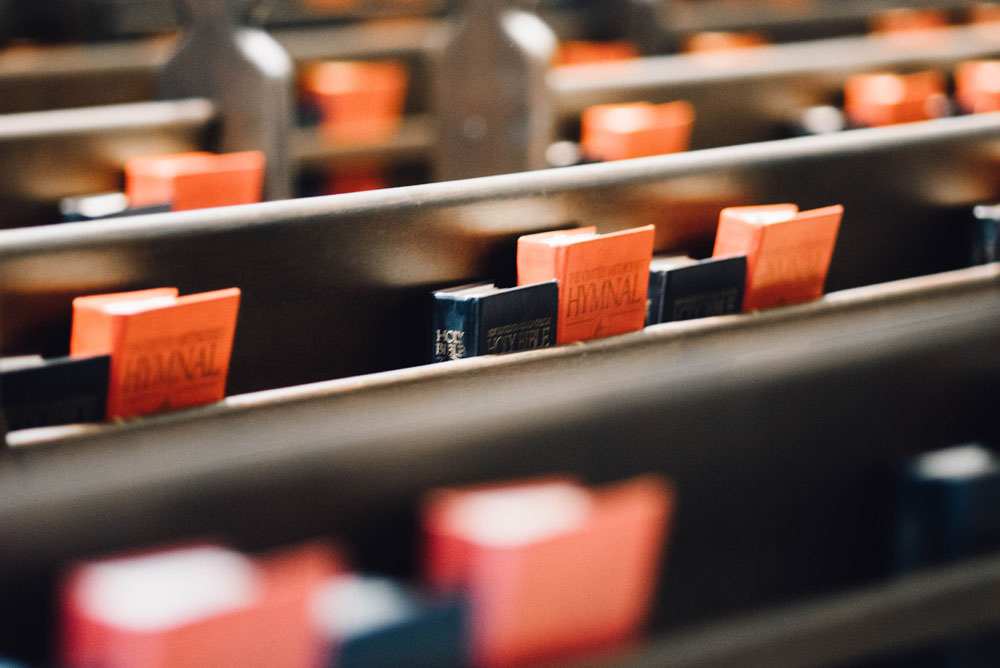
(Unsplash/chuttersnap)
The closing was announced in April by way of the church bulletin. Our church was slated to close in October. Three men in the pews groaned when they read the bulletin. "I had no idea," one said. A pall came over the congregation. After the final blessing, the pastor said he was sorry. He did not become a priest to close churches.
The next day I planted geraniums behind the home I shared with another sister. Bunches of pink and white and blood red.
Two weeks later we attended a town hall meeting in the church. A representative from a suburban church that would remain open came to put a good face on our closing. He said there were fewer priests to go around. In a former time, families were larger and parents were happy to give one of their children to the church. I told him that remark was the most ridiculous statement I had ever heard in our church. My mother and father had five children. They wept the day they brought me to the convent.
The next day I planted onions and wept myself.
On my knees planting, I kept hearing voices from the meeting.
"There's no handicap access where you are sending us," a woman with a walker said. "I planned to be buried here," an elderly gentleman lamented.
"The parish you are sending us to never received us when we went to school there. And they won't receive us now. Our church building is newer by a hundred years. We are in the black. We always pay our bills. Closing this church will be devastating to our deteriorating neighborhood."
I determined to plant extra tomatoes for the neighbors. What was this for so many? We needed a miracle. Instead, there were only voices.
A member of the church council explained, "We were given a choice," he said. "Be dragged down to our inevitable end, or choose the high road. I voted for the high road." One who voted "no" said the vote was meaningless. The decision to close had been made at least two years before, probably longer.
"Bad things happen when good people do nothing." This came from a longtime parishioner who added, "We are all good people here. We need a gut check to see if we did nothing."
A mother holding her sleeping 3-year-old said, "This building is not the church. We are the church." Then she added, "Our hearts will go on."
Three women who ran the food pantry that served 200 people a month knew the pantry would not go on.
A 90-year-old woman who laundered the altar cloths her whole life remained silent.
So did the saints watching it all in the stained glass windows. First among them stood Mother Mary holding her child. St. Patrick's feet squelched a slithering stake, while St. Cecelia piped heavenly music. St. Theresa stood in a bed of roses. John the Baptist, in a desert. Next to him his cousin pointed to his faithful heart, even as his feet walked on troubled waters.
What would become of these saints? Could we take them with us in our hearts?
Back in the garden I knelt and prayed to the Faithful One who had also knelt in a garden and prayed. Then I planted long rows of carrots that would last until the first hard freeze.
Advertisement
On Oct. 1, the bishop came in official array to celebrate the last Mass. "I'm sorry," he said, even as he closed the door. After this, many went downstairs to a catered luncheon. I remained in the pew as I had done in the same darkened church a long time ago.
I was 17, then, on the cusp of my life's greatest adventure. A week later I would enter the convent. Our gentlemanly pastor came over, offered his arm and escorted me to the newly installed cornerstone of the newly built church. There in large dark marble was the name of our church and the year of its founding.
"You and this church are dedicated to God in the same year," he said, with great pride, with such great love.
This dear man was long gone, and now the place he loved. His last words to me hung in the darkened church on this its last day. Like that mother holding her child, I wanted to believe that we were the church. But it was a hard sell and I wept. Even as I sat in the pew and watched the Eucharist being removed and the sanctuary light put out, I wept.
In the days that follow, we will go our separate ways to other churches. Some will leave off church altogether.
In the spring, tulips will bloom in our garden. They always do. And a great swath of bright yellow daffodils.
[Joan Sauro, a Sister of St. Joseph of Carondelet, publishes widely in the Catholic press. Her new book is titled We Were Called Sister. Her essay of the same name was awarded first place for Best Essay 2014 by the Catholic Press Association.]
We can send you an email every time The Field Hospital is posted. Go to this page and follow directions: Email newsletter sign-up.








